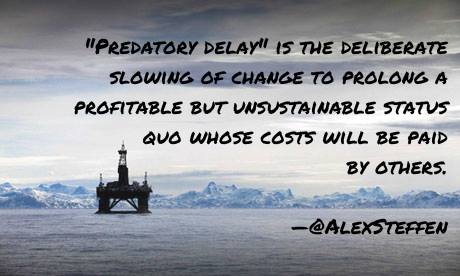
Alex Steffen was high on our list of people to meet on our recent San Francisco trip, but missed him this time round. I regret it even more after reading a blog he sent out yesterday on what he calls predatory delay. For more on what he is doing at The Heroic Futures, see here.
Meanwhile, as I limber up for an Oslo trip on Monday, where I will be speaking at three events, I’m finding the predatory delay concept helps crystallise a number of concerns I have had for some years about the whole sustainability industry.
Alex notes that: “Some people seem to have a hard time even understanding the concept of the rights of future generations. The idea that people who do not yet exist have the right to assert their needs in our lives is one that seems to be hard to fully grasp.
“Think of this example: If someone sets a bomb to go off in a public square a year from now, is he committing a crime? Should he be stopped? Almost everyone would say yes. Should he be tried before a court of law and prevented from doing further harm? Most of us would agree that he should. What about ten years? What about 100? When does our obligation to avoid serious, predictable harm to others end?
“Now, here’s the tricky part: climate emissions (and huge array of other unsustainable practices) are the bomb, and your grandkids and great-grandkids are the victims.”
He goes on to say:
“As long as we don’t use more of the planet’s bounty than can be sustainably provided in perpetuity, we have the ethical right to enjoy the best lives we can create. But the minute we stray into unsustainable levels of consumption, we’re not in fact spending our own riches, but those of future people, by setting in motion disasters that will greatly diminish their possibilities. Unfortunately, nearly everyone living a middle class or wealthier lifestyle now enriches their lives at the cost of future generations. As Paul Hawken says, ‘We have an economy where we steal the future, sell it in the present, and call it G.D.P.’
“Now, obviously, most of us did not intend to find ourselves in this situation, and so for a couple decades we had a legitimate argument that we needed a reasonable amount of time to change our ecological impact. It’s become clear that many of our leaders’ definition of a reasonable amount of time, though, is for things to change sometime after they’re dead.
“This is what I mean when I say that we have a politics of ‘predatory delay.’ Many wealthy people understand that their profits are extracted through destructively unsustainable practices, and they’ve known it for decades. By and large, they no longer deny the need for change, they simply argue for delay, on the basis that to change too quickly would be unfair to them.
“This allows them to been seen as responsible and caring. They want change, they claim; they just think we need prudent, appropriately paced change, mindful of economic trade-offs and judiciously studied — by which they mean cosmetic change for the foreseeable future. In the meantime, they fight like hell to delay change of any real magnitude, attacking not only the prospects of our kids and kin in the future, but increasingly of our society in the present. Their delay has real, serious human consequences, across generations. They’re taking, not creating; the harm they cause is measurable.”
For more of Alex’s thinking, sign up for his newsletter.

Leave a Reply